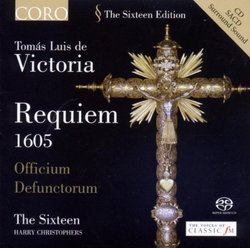| All Artists: The Sixteen, Harry Christophers Title: Victoria: Requiem 1605 Members Wishing: 0 Total Copies: 0 Label: Coro Original Release Date: 11/1/2005 Release Date: 11/1/2005 Album Type: Hybrid SACD - DSD Genre: Classical Styles: Opera & Classical Vocal, Chamber Music, Historical Periods, Classical (c.1770-1830) Number of Discs: 1 SwapaCD Credits: 1 UPC: 828021603327 |
Search - The Sixteen, Harry Christophers :: Victoria: Requiem 1605
 | The Sixteen, Harry Christophers Victoria: Requiem 1605 Genre: Classical
This new recording features the celebrated Requiem of 1605, Victoria's final composition, a work of beguiling beauty and sumptuous simplicity. It can be seen as the summation of both his art and the Spanish Renaissance tra... more » |
Larger Image |
CD DetailsSynopsis
Product Description This new recording features the celebrated Requiem of 1605, Victoria's final composition, a work of beguiling beauty and sumptuous simplicity. It can be seen as the summation of both his art and the Spanish Renaissance tradition. The beautiful plainsong on which it is structured can be heard arching through the texture, forming a delicate and sinuous line throughout. Subtly accompanied by a chamber organ and bajon, it is recorded here with the same forces as may well have performed it originally in the Monasterio de las Descalzas Reales. The Requiem is preceded by Marian Antiphons interspersed with three motets setting texts from the Song of Songs. Similar CDs
|
CD ReviewsGreat pacing, but with organ? Martin Kuplens-Ewart | Toronto, ON, Canada | 11/06/2008 (4 out of 5 stars) "What a lovely performance. Harry Christophers found a lovely pace at which to perform this most beautiful mass. Unfortunately, however, the recording features instrumental accompaniment in the polyphony. While this tends to not be too noticeable, there are several key moments in the music (where individual voices are isolated) where the organ is quite prominent. This mass needs no accompaniment - the ensemble should not need filling-in by additional instruments. That said, it is far from the typical plodding recording that most labels have published and, as such, is a very worthwhile addition to any period library." Beautiful Paige I. Mano | Milwaukee, WI | 10/22/2006 (4 out of 5 stars) "I heard this concert in Winchester Cathedral. Amazing, simply beautiful music. Contains songs from other recordings by the Sixteen, but excellent nonetheless." The Requiem of an Age Claude Greenmount | The Universe | 12/07/2009 (5 out of 5 stars) "Hearing an excellent performance of this great masterpiece, it is easy to understand why this work has been referred to as "The Requiem of an Age." It is a consummate example of the craft of modal counterpoint, chant-based polyphony, and the best example of the best compositional practice of the late Renaissance. A sense of grand, tragic sorrow pervades this music; one is not only saying "farewell" to a particular person (it was composed for the funeral rites of Empress Maria, Victoria's patroness), but to an era. In 1605, the time of the Requiem's composition, the smooth, graceful, subtle and sinuous lines of vocal counterpoint were giving way to the more overtly dramatic, instrumentally inspired style of the dawning Baroque. Just as the prayers of the Requiem Mass were intended to ensure the eternal life of the soul for whom it is sung, so Victoria's composition ensures the continued study and admiration of this great art form. By no means is this writer trying to imply that the Victoria Requiem of 1605 is solely responsible for the ongoing interest in Renaissance music, but you get the idea of the importance, beauty and general high quality of this music. But enough about Victoria, on the the work of the Sixteen.
Harry Christophers and The Sixteen never disappoint, and this recording is no exception. Accompaniment is simple and judiciously used, supporting but never overwhelming the vocal lines. The vocalists sing with clarity, precision, and exquisite attention to phrasing. One might wish for slightly more dramatic peaks in certain pieces, particularly the "Versa est luctum" but that is a wish expressed *very* mildly-- this is an outstanding performance. The motets presented here are also of great interest, particularly, the first, "Salve regina," which, like the Requiem, makes use of the chant as a departure point for the composition. Even if you already have a good recording of this piece (for a different take, and another superb reading of this piece, check out the one by the Gabrieli Consosrt), this one is worth adding to your collection. If this piece isn't already one of your favorite Renaissance Masses, even a casual hearing of it will likely give it a spot among your Polyphonic Top Ten." |

 Track Listings (16) - Disc #1
Track Listings (16) - Disc #1

